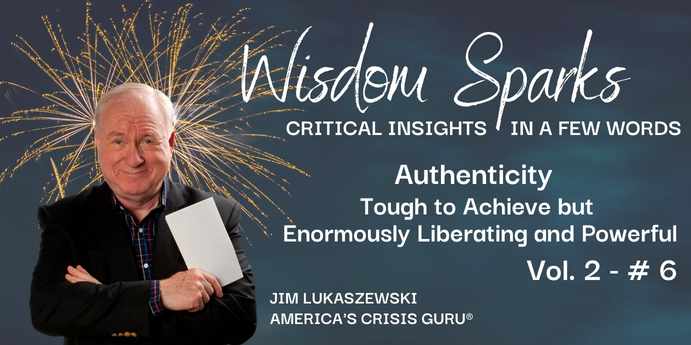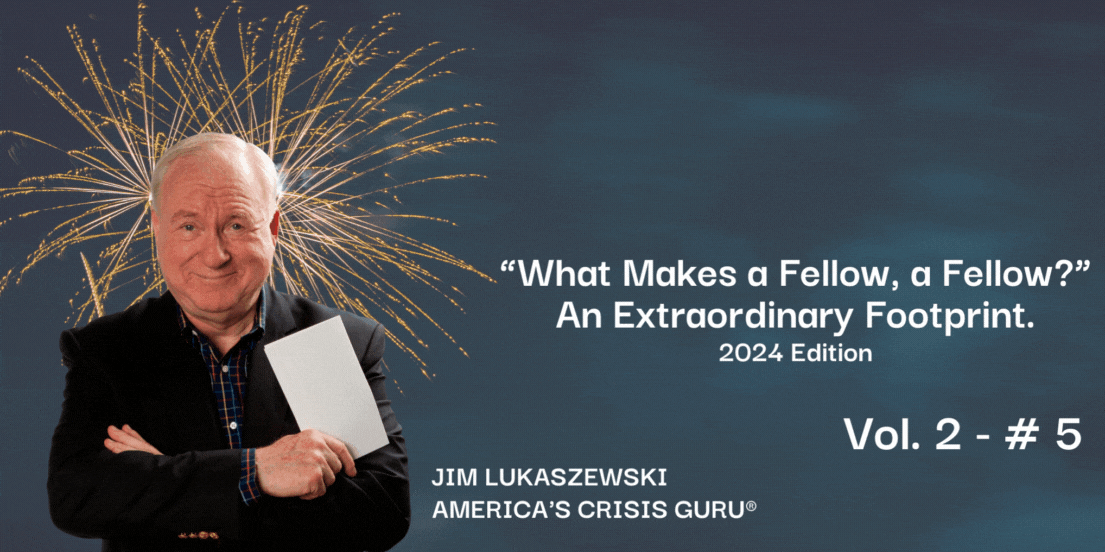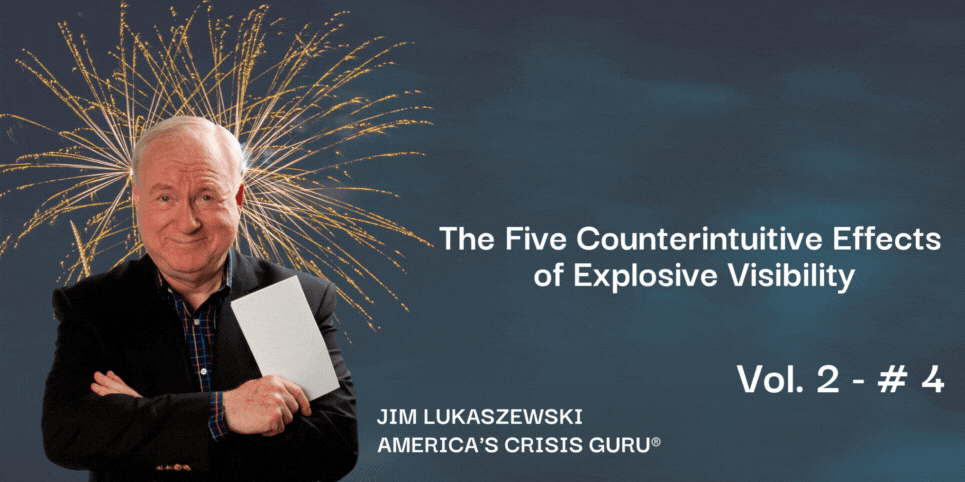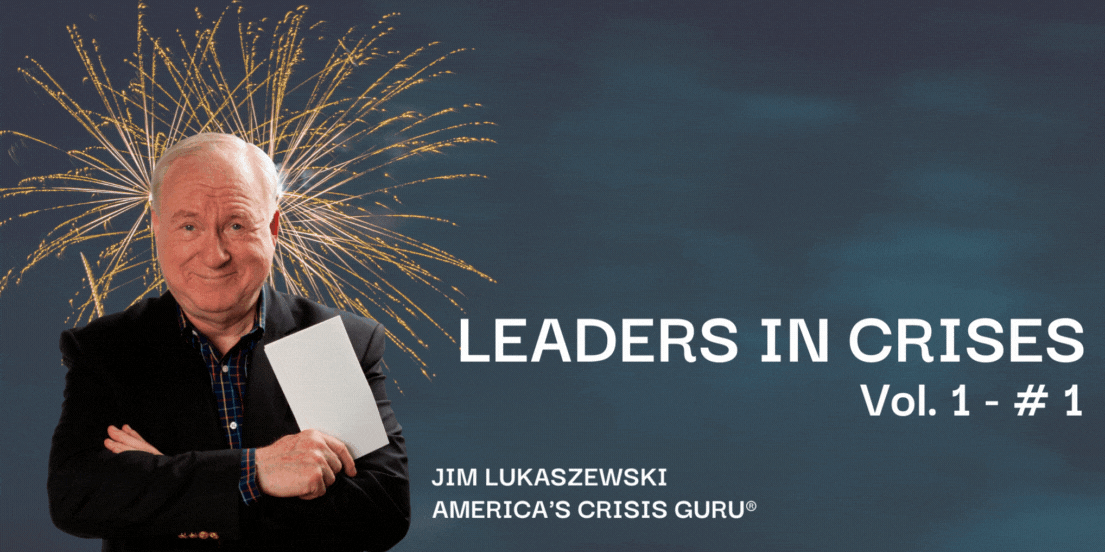An Extraordinary Footprint.
The Most Important Personal Honor in American Public Relations
Spring is the time of year when many of our PRSA senior colleagues are nominated or nominate themselves for election to the PRSA College of Fellows. As I begin my 31st year as a Fellow ‘93, it’s interesting to reflect on the experiences of all those I have coached or mentored over the years. Just about everyone comes to the process with few clues about what a being a Fellow actually is.
Becoming a Fellow is all about the footprint the candidate has left on the profession, culture, colleagues, and society. There are Fellows who have worked their entire careers in a single market and left a powerful footprint. There are Fellows who have worked in a single state and leave a significant footprint. There are Fellows who work regionally or nationally and, in the process, leave a meaningful footprint.
A footprint is about the quality of practice and the level of influence and relevance to the entire practice rather than how many projects completed, or awards won. This is the hardest part and biggest test of becoming a Fellow. It is a profound mindset shift from counting projects, clicks and likes to really understanding the power of the candidate’s intentional, personal impact, ideas, behavior and ethics that help others to become better and improve as practitioners, citizens, public officials, leaders, more honorable advisors, and people of professional substance; people who have then become more successful and influential among the people they impact, influence and change throughout their professional lives.
It’s also more than the activities within the Public Relations profession. It is about the candidates’ intentions, impact, influence, access, and acceptance in their vicinity, marketplace or practice specialties; it’s about how the candidate uses their influence, experience, insights and presence to make important change happen – perhaps bringing reality and sensibility, as well as reducing contention and bringing peace to important contentious circumstances.
Earning their access, intentions, influence, impact, acceptance, and inclusion in what matters.
Sometimes it’s easy to misread this impact, or mistake proficiency or expertise for leadership, personal impact on others. Those who wish to analyze their careers, to assess their footprint, ultimately go through an interesting and introspective analysis of their lives and work. These are the steps I recommend:
- Examine one’s life for the lessons that were shared with others and what others learned from their own perspective. And what the candidate learned from being helpful.
- Reach back and make contact with those whose lives the candidate truly affected, seek short real examples of the value to them from knowing the candidate.
- Ask those whohave known, worked, and benefited from the candidate’s efforts, presence, and insights the answers to five basic questions:
- What is/are/were the most important things, ideas or concepts that these individuals learned from the candidate?
- What is/are/were the most interesting things, ideas or concepts learned or remembered?
- What is/are/were those things these individuals feel they might never have learned had the candidate been absent from their lives . . . What do they know now that they didn’t know before that mattered because they met the candidate, whatever the circumstance?
- What meaningful questions did the candidate help others to confront, consider or explore that might not have happened had the candidate not been present?
- How has knowing the candidate changed people’s lives, in the beneficiary’s own words?
4. There are crucial personal questions the candidate must ask themselves.
- How have you stepped outside the realm of PR for some purpose larger than yourself? What, when and why?
- Can you explain your motivation or your intentions for achieving election to The PRSA College of Fellows?
- Can you provide a sense of the purpose of your life, larger than yourself?
- What evidence can you share that, rather than on yourself, you put the spotlight or gave the spotlight to others? Or, how you helped someone else find the spotlight for their work and accomplishments?
- How do your accomplishments fit together so we can know your plan or how your career was driven, by personal spontaneous actions, self-motivated activities, or other forces?
- Have you systematically shared your insights and learnings based on what you were accomplishing and learning in your practice?
- How do you share the principles that drive your practice in hopes that those you help will retain and apply them in their own practices? In other words, are you already acting like a Fellow?
- What are some of the lessons, morals, and self-evident truths about what and why you do what you do or believe what you believe?
5.
Can and do you explicitly share the principles and higher purposes, if any, and intentions that guide and influence your thinking and judgment and in turn constructively and memorably influence others.
- In simple single words and short phrases, how would you describe who you are?
- Should you be elected to The College of Fellows how do you plan to remain relevant to those who will seek your assistance and counsel?
6.
What were some of the surprises the candidate experienced as their access, influence, impact, and professional success expanded?
- True success in life is intentional. It may start by accident and often does.
- What were the Candidate’s intentions as success and visibility increased?
- What can the candidate pass on to PRSA’s leaders of tomorrow?
7.
How would the Candidate characterize their career purpose(s) and goals?
These questions matter because once a practitioner becomes a Fellow; all these impacts on others continue and intensify. It is more than an honor to be elected a Fellow. This election turns out to be a public recommitment by the candidate to helping our profession and our professional colleagues find ways to improve their skills, yes, but also to begin to look at their practices and their practice circumstances from larger, more powerful social and cultural perspectives.
Becoming a Fellow is about reinterpreting our professional metrics from a new, higher, and entirely different and more impactful perspective: Helping others become more substantive, influential and insightful practitioners. It’s about understanding what matters, what is helpful, what is sensible and often what is powerfully simple and true. It is about professional integrity, honesty, and having a truly meaningful personal and professional life.
It’s a life dedicated to the recognition of the needs and accomplishments of others and working on issues and questions larger than the candidate that creates the extraordinary footprint, election to the College of Fellows represents.
It’s that Extraordinary Footprint that makes a Fellow, a Fellow.
How extraordinary is the footprint the candidate presents in their application and in their life?
© Copyright 2024, James E. Lukaszewski. America’s Crisis Guru®
Get permission to reproduce or quote. Contact the copyright holder,
jel@e911.com. Subject line: Permissions





